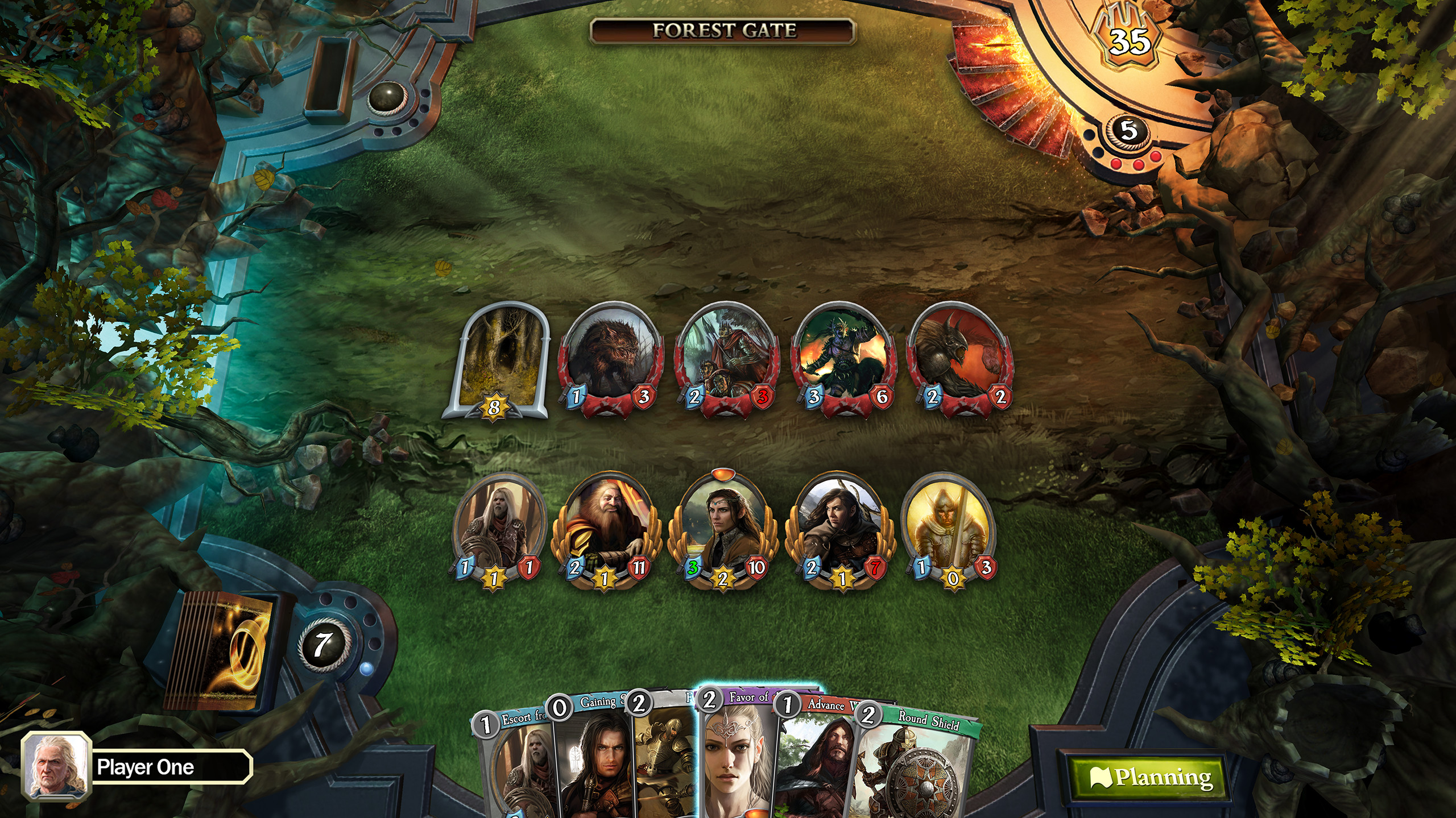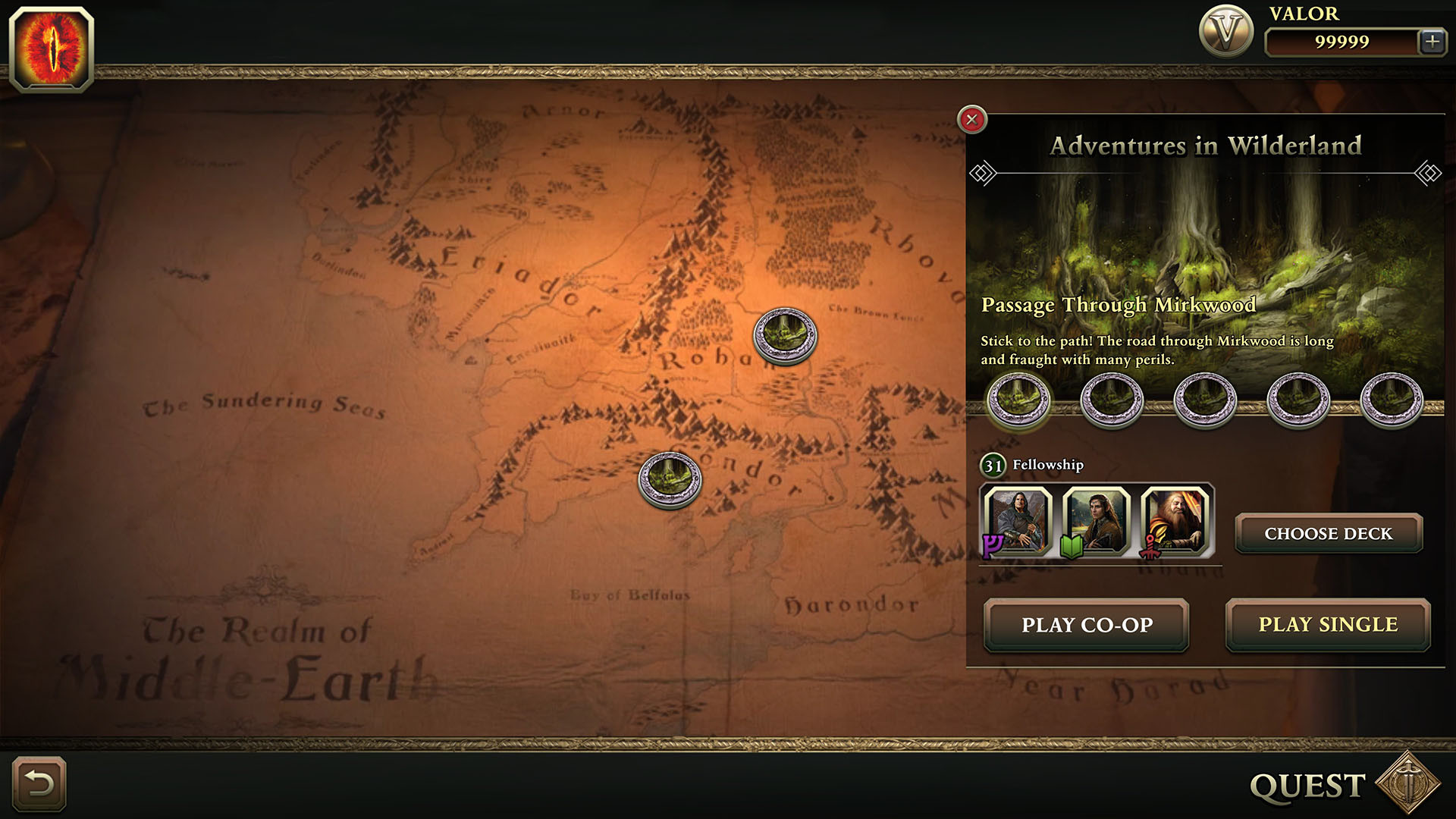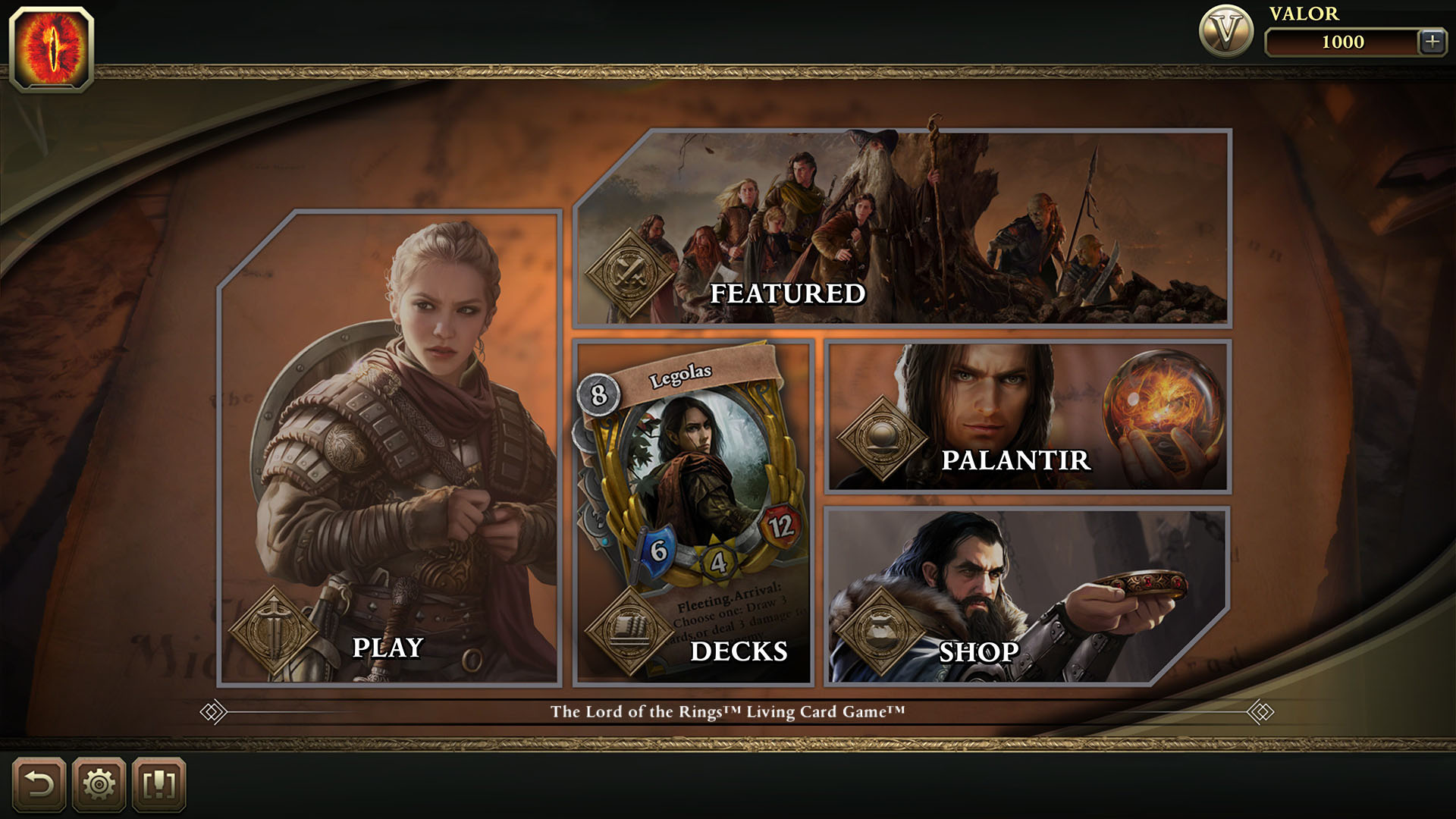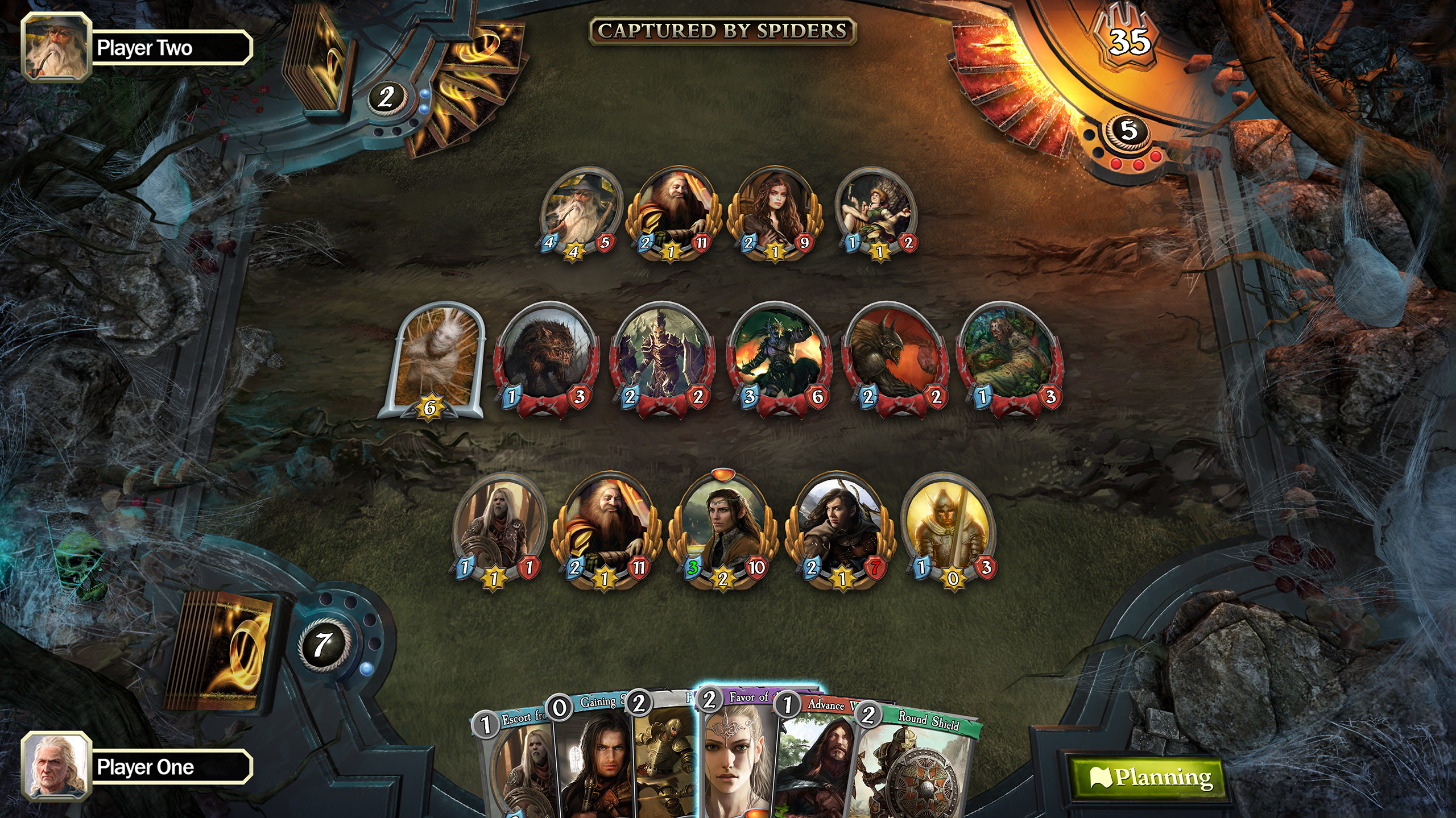
Let's face it, when it comes to collectible card games, most of us can only take so much ladder before generating enough salt to season every McMeal in America. Having some sort of PvE option helps, because losing to the computer is never quite as frustrating, and playing without the pressure of a turn timer, or some asshole emoting at you, makes for a refreshing break. Hearthstone's wildly popular Dungeon Run mode, and to a lesser degree the lethal puzzles in The Elder Scrolls: Legends, prove that PvE is increasingly core to what makes a good digital CCG.
That must be what the makers of The Lord of the Rings Living Card Game are banking on, because it dispenses with PvP entirely. Due in Early Access on Steam soon, it's based on an existing, and award-winning, physical card game from Fantasy Flight Games. The PC version, which is being published by Asmodee Digital, looks to replicate everything that fans liked about the physical experience, while leveraging the design space afforded by digital. Or in other words: It can do cool stuff with the cards that wouldn't be practical in real life.
Here's how the game works: It's split into a series of narrative campaigns, each containing five or more quests across different locations, which you must lead your team of heroes through. The card game is officially licensed from the books, so the expected characters are all here, and operate much as expected. Arwen is fragile but can administer a heal during each upkeep phase, while Gimli is purely combat focused.

All decks contain 30 cards and three heroes. Interestingly, damage and buffs—heroes can have up to three 'attachments'—remains persistent on characters between Quests, as do the cards in your hand. That makes for an interesting risk/reward dynamic during encounters. Do you try to end the battle as fast as possible, or do you try to draw more cards and get your team in good shape for the next battle. To prevent you from completely farming the AI, over time the 'threat level' of your party will gradually increase, and if it reaches 50 Sauron automatically wins. So, sorry control players, you can't just noodle around forever.
You can absolutely play a control style, though, as well as midrange, aggro and other deck archetypes familiar from most CCGs. Cards are divided by colour—green, purple, red and blue—each of which has its own thematic personality. For instance, purple represents leadership, which I'm told equates to mostly midrange cards. During my demo I only got to see one deck, so can't comment on what the class diversity is going to be like, but I did like the sound of how they're planning to distribute additional cards and campaigns.

Whilst in Early Access there will be a founders pack to get your collection started, but once the game goes into full release it will be free-to-play and there will be monthly expansions with new quests and heroes. Playing the game will earn you valor points which can then be spent on valor cards. These can't be bought with money, and you also can't get dupes of valor cards once you own two copies (ie the maximum you can include in your deck).
You will be able to buy hero packs with real money, but the contents of these are guaranteed—each includes a hero card and others that synergise with it. Taking the RNG out of spending feels like something that could interest quite a lot of CCG fans. All of that will only matter, though, if the base game is entertaining. From what I saw, The Lord of the Rings is a fairly standard mix of minion trading and resource management. You're always up against Sauron, and the sly bastard often begins with stuff in play.
Keep up to date with the most important stories and the best deals, as picked by the PC Gamer team.
Creatures with 'Pursuit' will follow you into the next encounter unless killed, so need to be prioritised.
Some of the keywords on cards did stand out as noteworthy: Creatures with 'Pursuit' will follow you into the next encounter unless killed, so need to be prioritised before you move on. In addition to attack and defence stats, friendly characters also have a willpower number, which is used to complete quests. These are represented by cards on the board which need to be defeated (but using your willpower stat, rather than the attack one) in order to activate a certain condition. This could result in ending the battle and moving to one of multiple new areas, or returning resources (ie cards) which Sauron has seized.
It's also worth talking about how you play cards in the first place. Each turn you receive three resources to spend (more if you're on the easier difficulty setting), and if you don't use them these carry over to the next turn. Again, that adds scope for planning out your moves across multiple turns. Maybe you take a little extra damage now in exchange for being able to play Gandalf, who comes with a predictably powerful effect, a turn earlier.

It'll require proper playtesting to determine how much depth this ultimately equates to, but apparently the physical game is notoriously hard and so you shouldn't expect to simply blitz the AI. I actually think the most fun way to play is going to be in co-op. Here the second player's forces appear above Sauron, and both of you get your own deck and set of heroes to manage. The opposing forces scale up accordingly to counter being double-teamed.
Lookswise, The Lord of the Rings is surprisingly pretty given the studio making it is just five months old. I imagine it helps that they already have all the art from the physical game to draw on. You can't expect the florid animations of Hearthstone at its best, but at first glance this looks to be a polished experience. I'll definitely be diving in to spend more time with Aragorn and chums once Early Access goes live. Right now I would say the biggest question mark will be over how compulsive building a collection feels without the threat of real players to overcome. Still, a little less sodium in my bloodstream has to be good news.
With over two decades covering videogames, Tim has been there from the beginning. In his case, that meant playing Elite in 'co-op' on a BBC Micro (one player uses the movement keys, the other shoots) until his parents finally caved and bought an Amstrad CPC 6128. These days, when not steering the good ship PC Gamer, Tim spends his time complaining that all Priest mains in Hearthstone are degenerates and raiding in Destiny 2. He's almost certainly doing one of these right now.


